You’ll typically need about €1,500–€2,000/month for a modest single lifestyle in Alicante and €3,500–€4,500 for a family of four when you include rent, utilities, food, transport and basic childcare. Expect one‑bed city‑centre rent near €858 and outside €670, utilities + internet ~€140–€150, groceries ~€200–€300 for one, and a public transport pass ~€24. With average net pay ~€1,662, you’ll see how rent drives savings and choices if you keep reading.
Monthly Budget Breakdown for Singles and Families
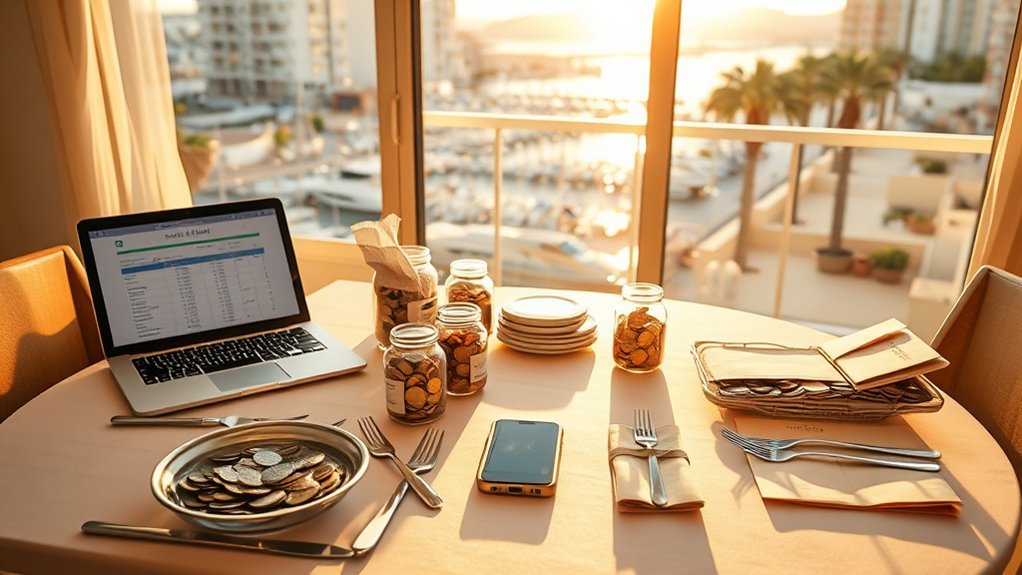
One typical single in Alicante spends about €812.10 monthly on non‑rent essentials (some sources cite closer to €692), while a family of four usually needs roughly €2,921.10 (alternate estimates around €2,489.10) to cover groceries, utilities, transport and leisure.
A single needs about €812 monthly for non‑rent essentials; a family of four around €2,921. Adjust budgeting accordingly.
You’ll use these benchmarks to plan a realistic Cost of Living. If you earn the average net monthly salary of €1,662.50, you can cover a single’s essentials but rent will squeeze your budget. For families, two incomes or savings are usually required.
Expect basic utilities for an Apartment (~85–90 m²) to run €97–€105 and internet about €27–€28 monthly.
Public transport monthly passes cost roughly €23.50–€25, so include them when projecting commuting expenses.
Tally groceries, utilities, transport and leisure against your income to spot gaps; adjust discretionary spending or seek additional income if totals approach or exceed earnings. Additionally, being aware of average repair costs can help you budget for unexpected expenses related to electronic devices.
Housing Costs: Rent, Buy and Utilities
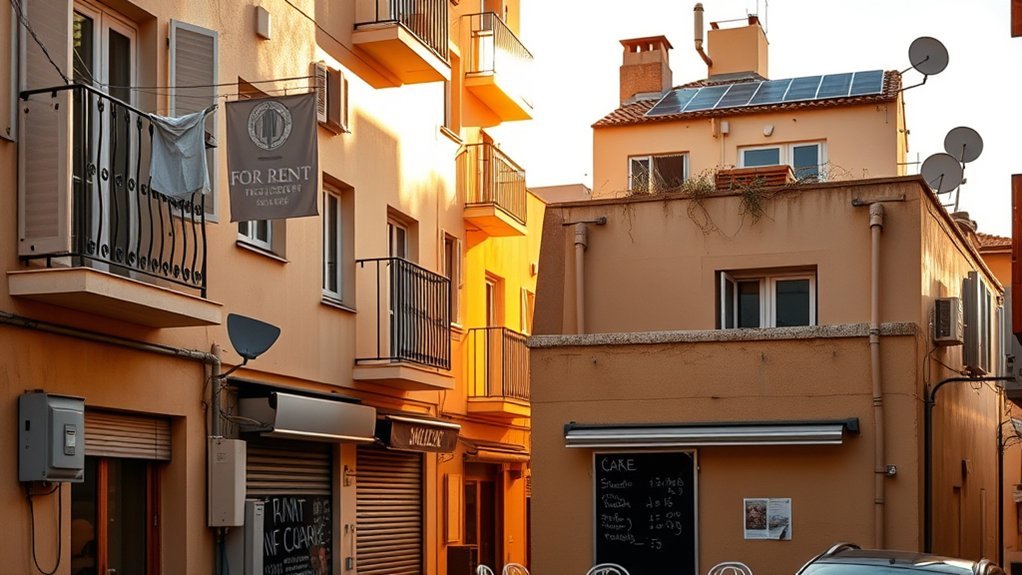
You’ll find city‑centre one‑bed rents around €858/month (typical €700–€1,000) versus about €670 (€500–€900) outside the centre, and three‑beds roughly €1,243 in centre vs €867 in the suburbs.
If you’re buying, expect average prices near €2,265/m² (centre ~€2,589/m², outskirts ~€1,700/m²; prime Playa de San Juan ~€3,117/m²) with 20‑year mortgages around 3.5%–4.0%.
Basic utilities for an ~85–95 m² flat run about €97–€105/month and unlimited 60+ Mbps internet is €27–€31. Additionally, understanding building costs can help you make informed decisions regarding your housing budget.
Rent: City Vs Suburbs
If you’re weighing city living against the suburbs in Alicante, the numbers make the trade-offs clear: a 1‑bedroom in the city centre averages about €858/month (typical €700–€1,000) versus ~€670 outside centre (€500–€900), while 3‑bedroom rents run roughly €1,243 in the centre compared with ~€867 outside.
Use these averages to plan: rent in Alicante is significantly higher downtown, but you gain proximity to services and transit. Outside the centre you’ll pay less and usually get more space.
Factor utilities (~€97–€105/month for an 85–90 m² flat) and internet (~€27–€28) into total monthly cost.
If you’re considering long term, compare rental savings to Buy Apartment in City or Buy Apartment Outside metrics and average cost per month when estimating mortgage versus rent.
Buying: Price per M²
Having compared city and suburban rents, it’s worth checking how buying stacks up by price per m² so you can judge long‑term value. You’ll find Alicante real estate averages about €2,265 per Square m² (up ~18.2% vs 2024). Central areas cost more, Playa de San Juan–El Cabo ~€3,117/m² and Centro ~€2,957/m², while outskirts can be near €1,700/m².
| Zone | Avg €/m² | Note |
|---|---|---|
| Centro | €2,957 | Prime central |
| Playa de San Juan–El Cabo | €3,117 | Coastal premium |
| City average | €2,265 | Market benchmark |
| Outside centre | €1,700 | Lower entry cost |
You should factor mortgage rates (~3.5–4.0% for 20 years) and compare against rent to decide total cost of ownership.
Utilities and Monthly Bills
Frequently, monthly living bills make as much difference to your budget as rent or mortgage payments, so you should factor them into any housing decision in Alicante. Look at services in Alicante and set realistic Estimated monthly costs: basic utilities (electricity, heating, cooling, water, garbage) for an ~85–90 m² apartment are about €97–€105.
Add internet (60 Mbps+ unlimited) at €27.50–€28 and a mobile Monthly Plan with 10+ GB at €15–€17. If you rent a 1‑bed in the centre (~€858) or outside (~€700), these utilities add roughly €140–€150 to your monthly outlay; for larger 3‑bed homes expect the same utilities range.
If you buy, include these recurring utilities plus mortgage interest when comparing total housing costs.
Food, Groceries and Eating Out Prices

To judge everyday food costs in Alicante, compare a basic grocery basket — milk €0.98–€1.09 per L, bread €1.38–€1.66 per 500 g, eggs €2.62–€2.81 for 12, rice ~€1.20/kg and chicken €3.74–€7.33/kg — against typical eating‑out prices.
Eating out is affordable: an inexpensive restaurant meal is about €15, a mid‑range three‑course dinner for two runs €25–€47, and a McMeal averages €9. Typical beverage prices are modest too, with cappuccinos ~€1.85, bottled water €0.58–€0.65 (1.5 L), domestic beer €0.99–€1.07 and mid‑range wine around €4.00.
Grocery Basket Costs
When you’re planning food costs in Alicante, expect moderate prices that keep everyday grocery shopping and occasional dining out affordable.
You’ll find Fresh White Bread (500 g) for about €1.38–€1.66; Basic supermarket staples like 1 L milk €0.98–€1.09 and a dozen eggs €2.62–€2.81 round out a weekly shop.
Fresh produce prices vary: apples €0.95–€2.08/lb, bananas €0.85–€1.57/lb, tomatoes €0.95–€2.19/lb, so buying seasonally saves money.
Proteins and common grocery items cost roughly €3.74/lb for chicken fillets and €6.20/lb for beef round; a mid‑range bottle of wine runs near €4.00.
Use these figures to build a realistic weekly or monthly grocery basket and adjust for your diet and household size.
Eating Out Affordability
Wondering how far your food budget will stretch in Alicante? You’ll find eating out reasonably priced: a three-course meal at a mid-range restaurant is about €25 per person, while an inexpensive restaurant meal averages €15. A McDonalds (or Equivalent Combo) runs roughly €9, so quick lunches stay affordable. Supermarket staples keep home cooking cheaper — milk €0.98, bread €1.38–€1.66, tomatoes €2.05/kg — making groceries less expensive than in many big cities.
| Situation | Typical Cost |
|---|---|
| Mid-range Restaurant (three-course) | €25 pp |
| Inexpensive restaurant | €15 |
| McDonalds (Equivalent Combo) | €9 |
| Grocery staples (examples) | €0.98–€2.19 |
Typical Beverage Prices
Usually, you’ll find drinks in Alicante are quite affordable: a cappuccino averages €1.85 (typical range €1.20–€3.50), a 0.33–0.5 L soda about €1.93–€2.02, and a domestic draught beer (0.5 L) runs roughly €2.50–€3.65 in pubs.
You’ll pay about €4.00 for a mid-range bottle of wine at retail (range €2.25–€8.00).
In supermarkets a 1.5 L water costs €0.58–€0.65 and a 0.5 L domestic beer €0.99–€1.07.
Imported small bottles are €1.54–€1.65 in shops, rising to about €3.50 in restaurants.
A McMeal is ~€9.00; a mid-range three-course dinner per person costs around €25 (for two, €37–€47).
These figures help you estimate Alicante living cost around drink budget, especially if you favor places in the city center.
Transportation and Mobility Expenses
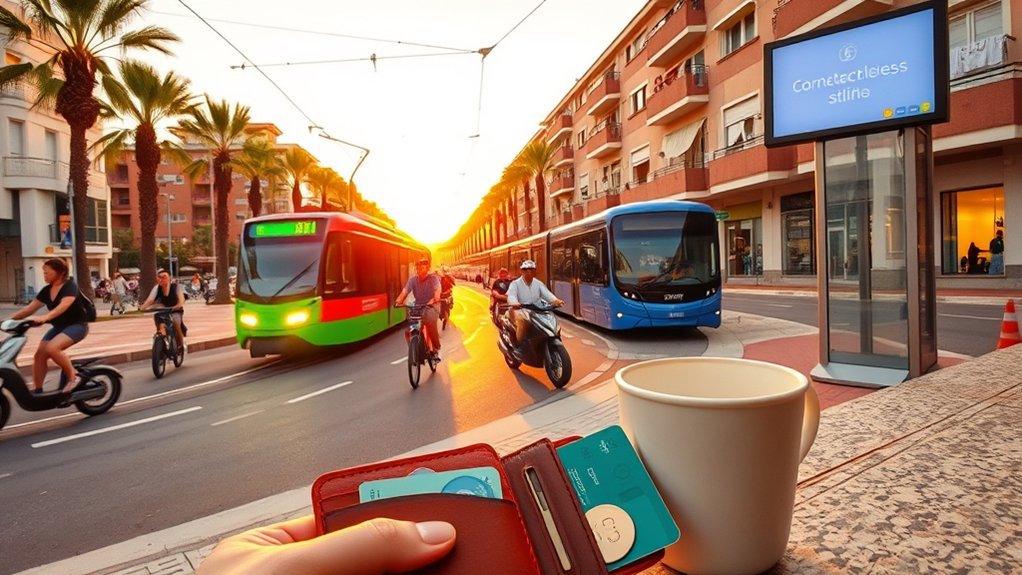
Getting around Alicante is affordable for most residents: a single one-way bus or tram ticket runs about €1.45 while a monthly pass costs roughly €23.50–€25, making public transit the cost-effective choice for daily commuting.
If you’re moving to Alicante, public transportation will likely be your cheapest regular travel option; a Local Ticket covers short trips, and a Monthly pass keeps commuting predictable.
Taxis start around €1.45 plus €1.20–€1.93/km, so use them for short evenings or heavy luggage.
Fuel at ≈€1.55/litre makes car ownership markedly pricier than transit.
Mobile connectivity is practical: prepaid calls near €0.32/min or plans with 10GB+ around €15.30/month support navigation and ride-sharing apps.
Balance convenience and cost by combining bus/tram for daily routes, occasional taxi for late nights, and a car only if you need frequent long-distance travel. Regular inspections of your vehicle’s AC system can help prevent costly repairs like hose replacements.
Pack a Summer Dress for coastal days—transport lets you reach beaches without driving.
- Choose monthly pass for daily commutes.
- Use taxis selectively.
- Compare mobile plans for apps.
Healthcare, Education and Childcare Costs
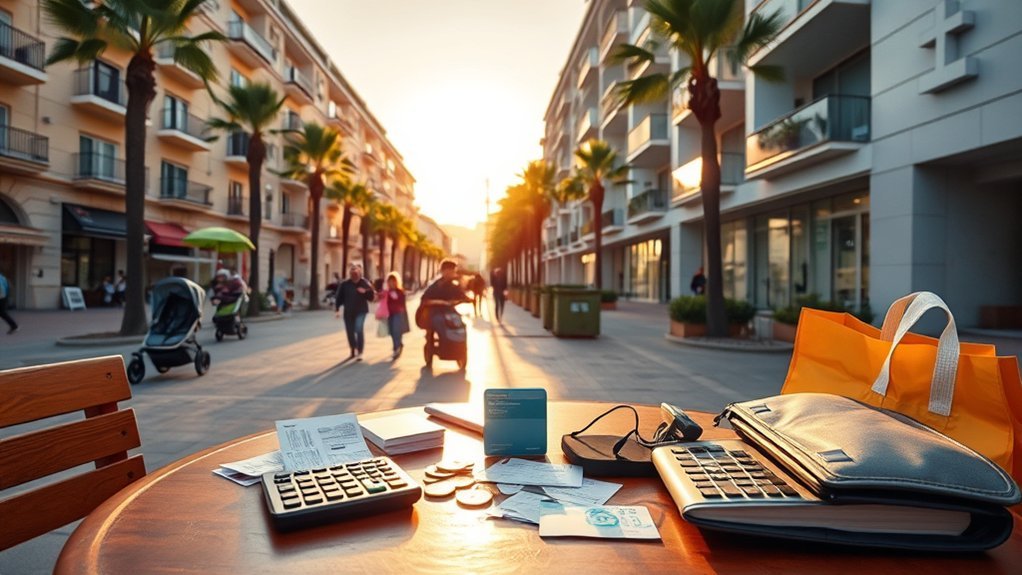
Although public healthcare in Alicante covers many routine services and keeps costs low for residents, you’ll still see out‑of‑pocket expenses if you prefer private care or faster specialist access.
A short private doctor visit (~15 minutes) typically costs about €56, while public healthcare remains far cheaper for most needs. Private health insurance reduces wait times and specialist fees but raises monthly costs versus relying on the public system.
For families, childcare and schooling choices drive expenses.
Full-day private preschool averages €450–€900/month (typical ~€617), so budget accordingly if you need daycare. Public Primary School is free, though small material or activity fees can apply, making public schooling the most cost-effective option. International Primary School fees run roughly €6,000–€14,400/year (typical ~€9,150), so factor that into annual budgets. Additionally, understanding the operational expenses associated with group homes can provide insights into overall living costs in the area.
Entertainment, Sports and Leisure Spending
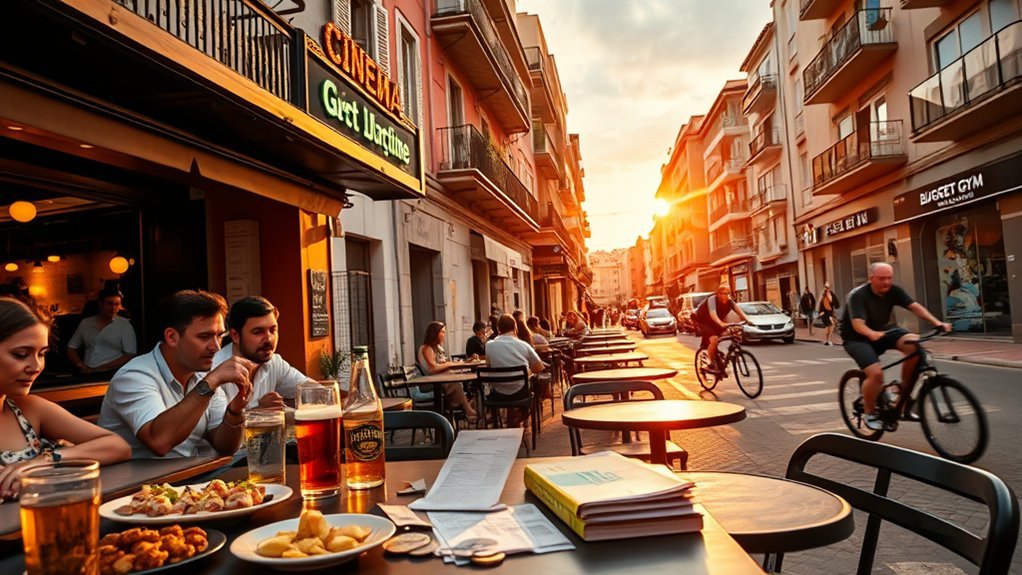
You’ll find entertainment and leisure in Alicante can fit modest budgets or scale up if you want more comfort: a gym membership typically runs €30–€55/month (about €55 in the business district), cinema tickets are €8–€10 each (roughly €15 for two), a 500 ml beer averages €3.65, and a mid‑range bottle of wine is about €4.
Outdoor recreation (beaches, parks, walks) is largely free, so you can keep costs low while enjoying high quality public spaces. Monthly leisure spending (gym plus 2–3 social outings) usually ranges €60–€120 depending on venue choices.
- Budget option: use free outdoor spaces, one cheap cinema night and occasional pub visits — €60–€80/month.
- Mid-range: regular gym, two cinema/bar outings monthly — ~€80–€100/month.
- Upscale: business-district gym, dining out more frequently — €100–€120+.
Living in Alicante is affordable compared with many cities in Spain, offering a balance of low-cost options and high quality lifestyle choices. Additionally, investing in long-term savings through a home gym can significantly enhance your fitness experience while reducing ongoing costs like gym memberships.
Salary Levels and How Much You Can Save
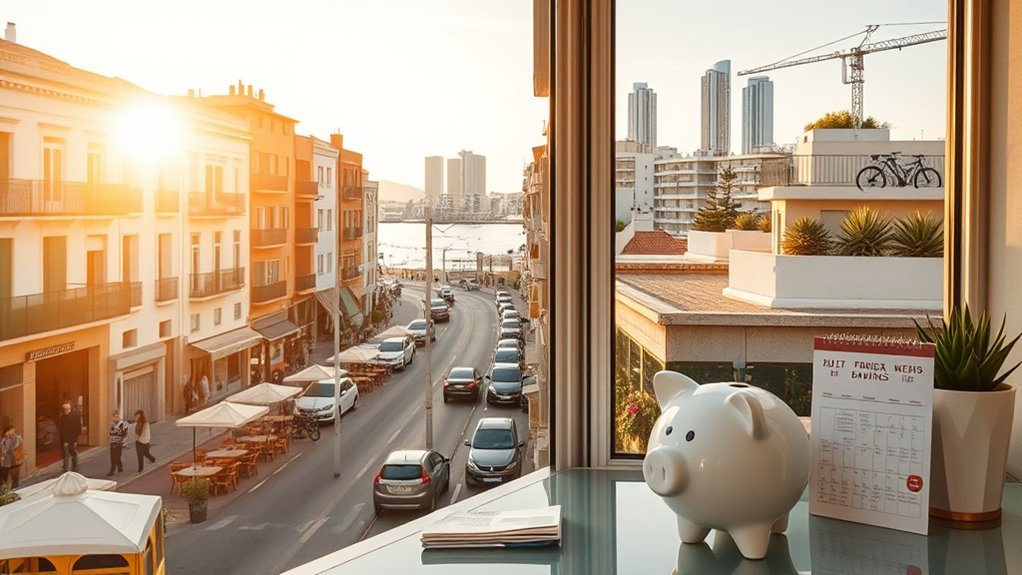
Because net salaries in Alicante average about €1,662.50 per month, you can cover typical non‑rent living costs (around €812/month for a single) with room to save — provided you keep rent moderate.
With average net pay of €1,662.50, typical non‑rent costs (~€812) are covered—so moderate rent leaves room to save.
With the Average net monthly salary as your baseline, calculate savings by subtracting non‑rent costs and rent.
A city‑centre one‑bed at ~€858 would consume ~52% of take‑home pay; outside centre at ~€670 uses ~40%.
Add utilities (€97–€105), internet (€27–€31) and transport (~€23–€25) to model monthly outflows.
If you prioritise lower rent, you’ll likely save a meaningful share each month; if you choose a central flat, savings shrink.
Alicante’s standard of living is slightly below major cities, but lower housing and grocery costs mean comparable incomes often stretch further.
For discretionary spending, note common prices (a Pair of Jeans or dining out) to refine your budget and set realistic monthly saving targets. Additionally, managing legal fees can help you allocate more funds towards savings or discretionary spending.
Frequently Asked Questions
How Much Money Do You Need to Live in Alicante?
You’ll need about €1,500–€2,800/month depending on housing. Use a cost breakdown and neighborhood guide, factor commuting expenses and seasonal variations, compare rent versus utilities, groceries, transport, and discretionary spending.
Can You Live in Spain With $2000 a Month?
Yes — you can live comfortably on $2,000/month in Spain if you choose affordable locations; check visa requirements, guarantee healthcare access (public or private), and compare costs regionally to optimize savings and lifestyle choices.
How Much Is the Average Apartment in Alicante Spain?
Right off the bat, average apartment prices hover around €2,265/m² citywide, so you’ll pay roughly €120k–€180k for typical flats; consider renter’s insurance, utility averages, neighborhood comparison, and furnished options when budgeting.
Can You Live on $1000 a Month in Spain?
You can, but it’s tight: on $1,000 monthly you’ll need budget travel habits, buy local groceries, seek seasonal work, rely on public transport, and verify healthcare access; expect minimal savings and careful expense tracking.
Conclusion
You’ll find Alicante comfortably affordable without sacrificing comforts. With modest rents, reasonable groceries, and efficient transport, you can stretch your salary further than in many Spanish cities. Healthcare, schools, and leisure carry sensible price tags, so families and singles alike can plan realistically. If you’re aiming to save, target housing choices and dining habits — those are where gains quietly accumulate. Overall, Alicante lets you live well while keeping your finances pleasantly under control.


